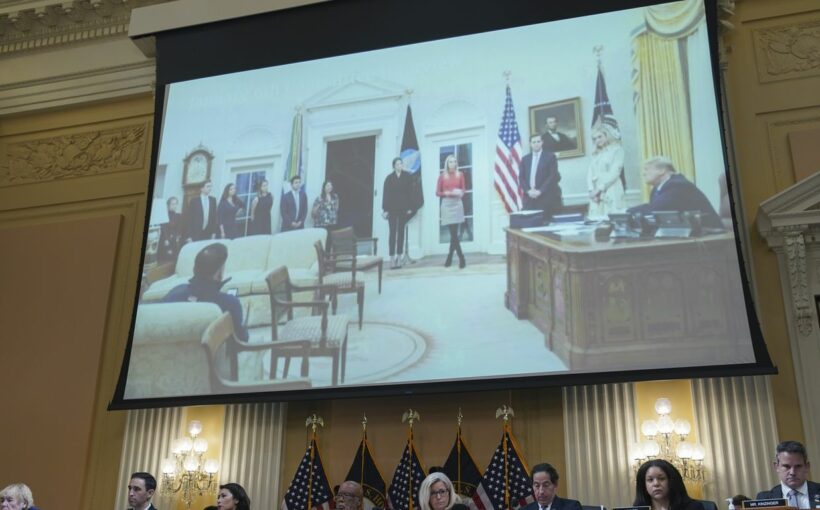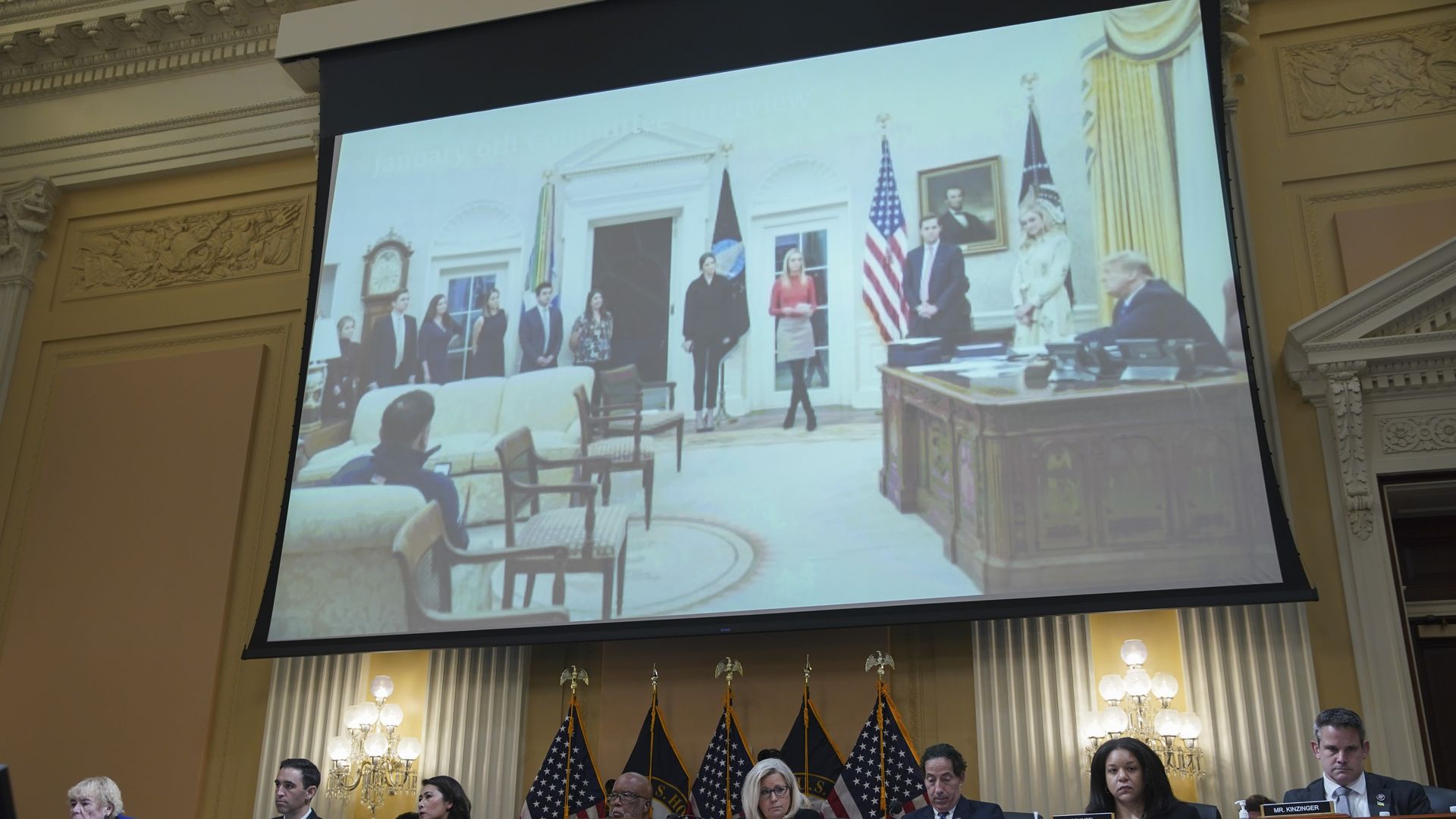An image of former President Trump displays on a screen during a Jan. 6 committee hearing. Photo: Al Drago/Bloomberg via Getty Images
Former President Trump deliberately drew his supporters to Washington to protest the election results on Jan. 6, and is ultimately responsible for the violence that unfolded at the Capitol that day, the Jan. 6 committee contended in its seventh public hearing on Tuesday.
Why it matters: Through a mix of stunning videos from late December 2020, public testimony and newly revealed documents, the committee revealed how pro-Trump extremist groups and far-right supporters coalesced around a Dec. 19 Trump tweet, viewing it as a call to action that resulted in the Jan. 6 attack.
- “Donald Trump's 1:42am tweet electrified and galvanized his supporters —especially the dangerous extremists, the Oath Keepers, the Proud Boys and other racist, white nationalist groups spoiling for a fight against the government," said Rep. Jamie Raskin (D-Md.), a member of the committee.
- “American carnage, that’s Donald Trump’s true legacy,” Raskin said.
Trump's tweet
Trump's tweet came days after the Electoral College announced on Dec. 14, 2020, that Joe Biden was the rightful winner of the 2020 election, something many top White House officials had urged Trump to accept.
- Trump "had access to more detailed and specific information showing that the election was not actually stolen than almost any other American," committee Vice Chair Liz Cheney (R-Wyo.) emphasized.
- "No rational or sane man in his position could disregard that information and reach the opposite conclusion. And Donald Trump cannot escape responsibility by being willfully blind."
Dec. 14 electoral college deadline
A series of top Trump administration officials, including former White House Counsel Pat Cipollone and Labor Secretary Eugene Scalia, testified that after Dec. 14, they knew it was time for Trump to concede. Scalia said he told Trump as much.
- Cipollone, appearing on video from his closed-door testimony on Friday, also told the committee that then-White House chief of staff Mark Meadows assured him and Attorney General Bill Barr that Trump would concede after that date.
- "Trump's legal team, led by Rudy Giuliani, knew they lacked evidence of widespread fraud sufficient to prove that the election was actually stolen," Cheney said, but they still urged the country against accepting the election results.
"Unhinged" Oval Office meeting
Cipollone and former White House aide Cassidy Hutchinson testified that four conspiracy theorists marched into the Oval Office on Dec. 18, 2020, to discuss seizing voting machines — a meeting that quickly descended into chaos.
- The group, consisting of Sidney Powell, Giuliani, former Overstock CEO Patrick Byrne and Trump's former national security adviser Michael Flynn,had already drafted a proposed executive order to do so.
- But several White House officials, including Cipollone and lawyer Eric Herschmann, pushed back in real time, telling them such a move was illegal and unconstitutional.
- Cipollone said the four exhibited a "general disregard for backing what you actually say with facts." He added he was “vehemently opposed” to the idea of Powell being appointed as special counsel to head the effort.
Hutchinson, in a series of texts to another White House aide, described that night in the West Wing as "UNHINGED," adding it devolved into "a brawl."
- A detailed account of the meeting was reported by Axios in February 2021.
What was Trump's tweet?
As Axios first reported, the committee focused heavily on a Dec. 19, 2020, tweet from Trump calling on his supporters to join him in Washington on Jan. 6.
- "This tweet served as a call to action and in some cases as call to arms for many of President Trump's most loyal supporters," Rep. Stephanie Murphy said.
Videos of pro-Trump, far-right media personalities from December 2020 revealed how the tweet sparked a broader conversation among extremist groups about invading the Capitol on Jan. 6
- One pro-Trump supporter called for a "red wedding" while another discussed supporters forcing their way into the Capitol.
The committee also unveiled documents and text exchanges revealing Trump had long planned to direct his supporters to march to the Capitol after his "Save America" speech on the Ellipse on Jan. 6.
- "The evidence confirms that this was not a spontaneous call to action, but rather a deliberate strategy decided upon in advance by the president," Murphy said.
A former Twitter employee told the committee it was clear to the company — which was monitoring the online activity of many of Trump's supporters and extremist groups — that something dangerous was going to happen on Jan. 6.
- "For months, I had been … attempting to raise the reality that if we made no intervention into what I saw occurring, people were going to die. On Jan. 5, I realized no intervention was coming," the anonymous employee testified.
- The former Twitter employee also testified that the platform considered adopting a "stricter" moderation policy after Trump tweeted at the Proud Boys to "stand back and stand by," but the company ultimately "chose not to act."
Pressure on Pence
Ten GOP House members attended a Dec. 21 meeting at the White House focused on efforts to pressure former Vice President Mike Pence to help overturn the 2020 election, according to White House visitor logs obtained by the committee.
- Attendees included: Reps. Brian Babin (R-Texas), Andy Biggs (R-Ariz.), Matt Gaetz (R-Fla.), Louie Gohmert (R-Texas), Paul Gosar (R-Ariz.), Andy Harris (R-Md.), Jody Hice (R-Ga.), Jim Jordan (R-Ohio), Scott Perry (R-Pa.) and now-Rep. Marjorie Taylor Greene (R-Ga.).
- Reps. Mo Brooks (R-Ga.) and Debbie Lesko (R-Ariz.) joined by phone, per Hutchinson.
- Hutchinson told the panel the members "felt that [Pence] had the authority to … [send] the electors back to the States," according to a court filing from April.
Trump also insisted his Jan. 6 speech include specific lines attacking Pence, after the two spoke on the phone and Pence made clear he wouldn't change the election results, new documents revealed.
- "Reinsert the Mike Pence lines,” Trump told his staff following the call.
- One line included: “And we will see whether Mike Pence enters history as a truly great and courageous leader.”
Stephen Ayres and Jason Van Tatenhove testimony
Jan. 6 rioter Stephen Ayres and former Oath Keepers national media director Jason Van Tatenhove offered a vantage point into what motivated them to travel toWashington on the 6th.
- Ayres testified that he "was hanging on every word [Trump] was saying" regarding a stolen election, and that prompted him to illegally enter the Capitol on Jan. 6.
- In hindsight, Ayres said: "I feel like I had horse blinders on," and urged other pro-Trump supporters to "take the blinders off, take a step back, before it's too late."
Tatenhove said he was radicalized by the Oath Keepers, got caught up in Trump's claims of fraud.
- Tatenhove noted Jan. 6 offered a glimpse of "the vision of the Oath Keepers … It doesn't necessarily include the rule of law. It includes violence."
- He said that type of messaging could have easily sparked a civil war: “What it was going to be was an armed revolution.”
Trump reaches out to witness
In the closing minutes of Tuesday's hearing, Cheney revealed that Trump attempted to call an unidentified witness in the investigation following Hutchinson's testimony.
- It was a "witness you have not yet seen in these hearings," Cheney said, adding, "That person declined to answer or respond to President Trump’s call and instead alerted their lawyer to the call. Their lawyer alerted us."
- Cheney said the committee referred the matter to the Department of Justice, which has the power to prosecute Trump if they determine he tried to tamper with a witness.
What's next
Cheney said the committee's next hearing will focus on Trump's actions while the violence at the Capitol was taking place.
- Cipollone, who met on the record with the committee on Friday, will be a crucial feature of that hearing.
- "Mr. Cipollone's testimony met our expectations,” Cheney said.
Go deeper: Former Trump campaign manager said he felt "guilty" for helping Trump win on Jan. 6
Source: Read Full Article

